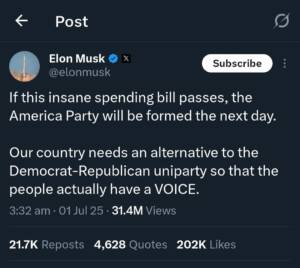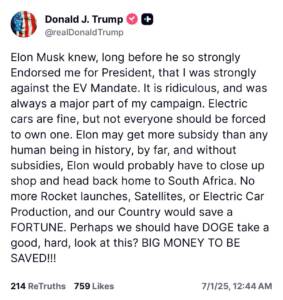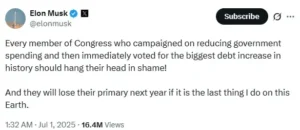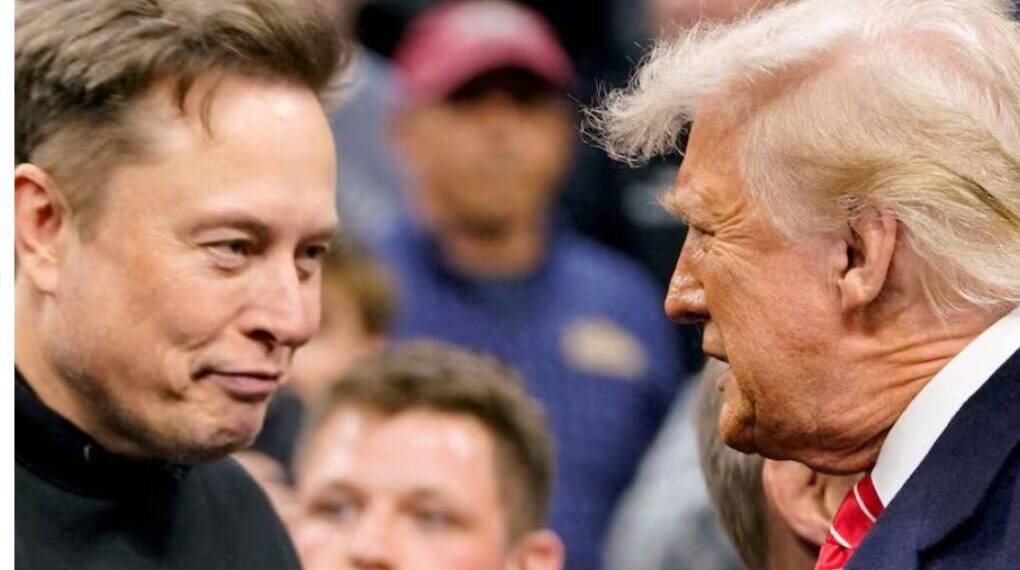A public feud between U.S. President Donald Trump and billionaire entrepreneur Elon Musk has placed the spotlight on a new and unexpected political development: the potential formation of a third major political party in the United States.
Sparked by disagreements over Trump’s controversial “Big Beautiful Bill,” which proposes broad fiscal reform, the dispute now touches issues of national spending, government subsidies, and political identity.
In response to the bill, Musk has proposed forming the “America Party,” a new political entity that, if realized, could disrupt the current bipartisan landscape and give rise to a new ideological movement.
What Is the “Big Beautiful Bill”?
Trump’s legislative proposal, dubbed the “Big Beautiful Bill,” includes the following key elements:
A $5 trillion increase to the U.S. debt ceiling
Cuts to social programs such as Medicaid
Expanded defense spending
A freeze on certain AI regulations
A higher SALT deduction cap, raised to $40,000
Imposition of asylum processing fees
The bill is marketed as a conservative blueprint for long-term fiscal discipline and national security enhancement. However, critics argue that it increases long-term debt and benefits entrenched industries over innovation sectors.
Elon Musk’s Opposition
Elon Musk, CEO of Tesla and SpaceX and once a policy advisor to Trump via the Department of Government Efficiency (DOGE), has emerged as a leading critic of the bill. Musk argues that the legislation harms forward-looking industries, such as electric vehicles and space exploration, and worsens the national deficit.
On X, his social platform, Musk warned that if the bill passes, “the America Party will be formed the next day,” stating the U.S. needs “an alternative to the Democrat-Republican uniparty so that the people have a VOICE.”

Trump’s Counterattack
Trump, in turn, questioned the legitimacy of subsidies received by Musk’s companies and suggested that DOGE investigate them. In a post, he wrote:
“Elon may get more subsidies than any human being in history, by far… Perhaps we should have DOGE take a good, hard look at this?”
The president implied that Musk’s companies—Tesla, SpaceX, and others—might not survive without federal support, a point Musk pushed back on by declaring: “CUT IT ALL. Now.”

The America Party: Significance of a New Political Movement (America Party)
While third-party efforts in U.S. politics are not new, Musk’s proposed “America Party” arrives at a unique political moment. Its significance lies in several key areas:
1. Challenging the Two-Party Dominance
Musk’s framing of Democrats and Republicans as a “uniparty” reflects rising dissatisfaction among centrist and independent voters. A successful third party could appeal to Americans who feel politically homeless.
2. Disrupting the 2026 and 2028 Elections
With over 220 million followers on X and vast financial resources, Musk could reshape upcoming primaries and general elections by endorsing or opposing candidates, funding challengers, and running America Party candidates.
3. Redefining Political Agendas
The America Party, if launched, could promote a platform focused on:
Technological innovation
Fiscal restraint with targeted investment
Deregulation of emerging technologies
Reform of legacy subsidy programs
This could realign American policy discussions around forward-looking, innovation-driven growth models.
4. Economic and Industrial Implications
If successful, the party could advocate for reevaluating subsidy frameworks, public-private partnerships in space and AI, and digital governance. This might reshape how industries like EVs, AI, and aerospace interact with the government.
5. Mobilizing Tech-Savvy Voters
Musk’s influence among younger, tech-savvy demographics—many of whom are disillusioned with traditional politics—could energize a new voting bloc around themes of disruption, independence, and future-focused policy.
Political Feasibility
Despite the attention, forming a viable third party remains a steep challenge:
Ballot access: Complex rules vary by state, requiring significant organizational effort
First-past-the-post voting: The U.S. electoral system heavily favors two parties
Institutional resistance: Both parties and the media ecosystem are resistant to third-party growth
Cohesion: A new party would need more than a high-profile founder—it must offer a coherent, appealing platform and credible candidates
Still, Musk’s social and financial influence, combined with growing polarization, gives this effort more visibility than most past attempts.
Fallout Within the GOP
Musk has vowed to support primary challengers against Republicans who support the bill, signaling a more active political role. His criticism targets GOP members such as Andy Harris, Chip Roy, and Markwayne Mullin, highlighting internal divisions within the party on issues like spending and innovation.

This internal pressure could force Republican lawmakers to clarify their positions on fiscal policy, government intervention, and tech regulation ahead of the 2026 elections.
The feud between Donald Trump and Elon Musk has grown beyond a personal or policy dispute—it now signals potential shifts in American politics. The possibility of an “America Party,” while still in its conceptual phase, has already ignited public discussion about the viability of a third-party movement, the influence of tech billionaires in politics, and the ideological direction of the Republican Party.
Whether the America Party becomes a serious political force or remains a rhetorical tool, it reflects real tensions within U.S. governance: between tradition and innovation, spending and efficiency, establishment and disruption.








